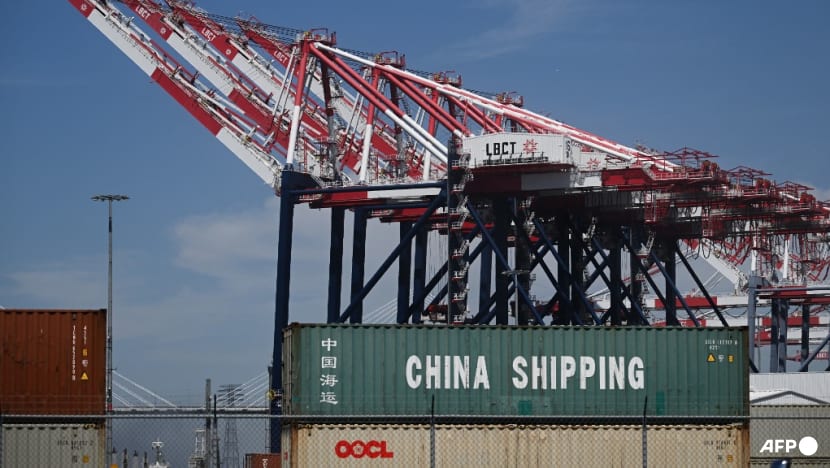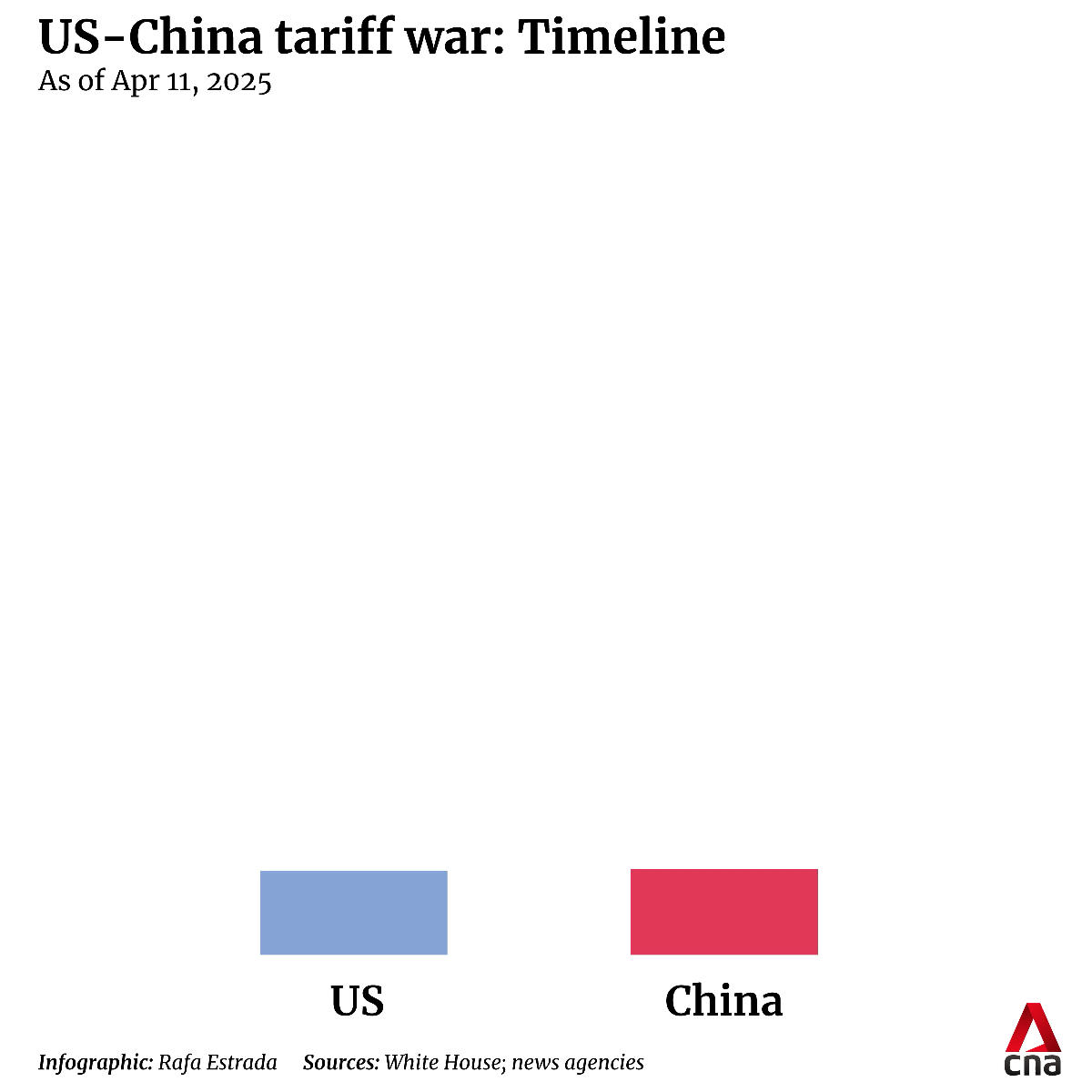China hits back at Trump tariff hike, raises duties on US goods to 125%
China also blasted US President Donald Trump's tariffs as a "numbers game" that "will become a joke".

A China Shipping cargo container sits stacked at the Port of Long Beach in California on Apr 10, 2025. (Photo: AFP/Patrick T Fallon)
BEIJING: Beijing on Friday (Apr 11) increased its tariffs on US imports to 125 per cent, hitting back against President Donald Trump's decision to hike duties on Chinese goods to 145 per cent.
The 125 per cent tariffs, up from 84 per cent, will apply from Saturday, further raising the stakes in a trade war that threatens to upend global supply chains.
Beijing's retaliation sparked fresh market volatility, with stocks seesawing, gold prices surging and US government bonds under pressure.
In a message on social media on Friday morning, US President Donald Trump continued to insist that "we are doing really well on our tariff policy."
"Very exciting for America, and the World!!! It is moving along quickly," he wrote.
But in a sign of investors' worries about the health of the US economy under Trump's erratic stewardship, the dollar fell to a three-year low against the euro.
The hike comes after the White House kept the pressure on the world's No 2 economy and second-biggest provider of US imports by singling it out for an additional tariff increase, having paused most of the "reciprocal" duties imposed on dozens of other countries.

"The US imposition of abnormally high tariffs on China seriously violates international and economic trade rules, basic economic laws and common sense and is completely unilateral bullying and coercion," China's finance ministry said in a statement.
It also said China would "ignore" further tariff hikes by the US because American goods would no longer make economic sense for importers.
"The US' repeated imposition of abnormally high tariffs on China has become a numbers game and has no practical economic significance," the statement read, adding that China urges the US to "take a big step forward in eliminating the so-called 'reciprocal tariffs' and completely correct its wrongful practices".
The country's commerce ministry reiterated that China will resolutely take countermeasures and "fight to the end" if the US insists on continuing to infringe on its interests in a substantive way.
Timeline of the US-China trade war since Trump’s return to office
Feb 1, US: Announces an additional 10 per cent tariff on all imports from China over its alleged role in the fentanyl supply chain.
Feb 4, China: Retaliates with a package of tariffs on a range of US products - 10 per cent levies on crude oil, farm equipment, large-displacement vehicles and pickup trucks, and 15 per cent on coal and liquefied natural gas (LNG).
Mar 4, US: Doubles the tariff on China to 20 per cent.
Mar 4, China: Responds with an additional 15 per cent tariff on US chicken, wheat, corn and cotton as well as an extra 10 per cent levy on soybeans, sorghum, pork, beef, aquatic products, fruits and vegetables and dairy imports.
Apr 2, US: Trump's so-called "Liberation Day" when he announces an additional 34 per cent duty on Chinese imports as part of his slew of "reciprocal" tariffs. The reciprocal tariff comes on top of the earlier 20 per cent levy.
Apr 4, China: Matches the US' new reciprocal tariff by announcing an additional 34 per cent duty on all US imports.
Apr 7, US: Threatens to raise the reciprocal tariffs on China to 104 per cent if it does not withdraw the 34 per cent levy.
Apr 9, US: Follows through with the threat, and the higher tariffs kick in.
Apr 9, China: Hits back by raising its earlier 34 per cent levy on US goods to 84 per cent.
Apr 9, US: Responds by raising the reciprocal tariffs on China further to 125 per cent later in the day. (This is on top of the 20 per cent tariff the US announced on Mar 4)
Apr 11, China: Retaliates by raising the extra tariff on US imports to 125 per cent as well.
"WILL BECOME A JOKE"
A commerce ministry spokesperson blasted the tariffs as a "numbers game" that "will become a joke", and that the US should bear full responsibility for Trump's scattergun tariff regime.
Chinese Foreign Minister Wang Yi said "the US cannot act recklessly, and the wheel of history cannot go backwards."
Wang made the remarks in a meeting with the International Atomic Energy Agency's Director General Rafael Mariano Grossi in Beijing.
China's mission to the World Trade Organization separately said on Friday it had filed an additional complaint to the trade body over US tariffs.
Trump had told reporters at the White House on Thursday that he thought the US could make a deal with China and said he respected Chinese President Xi Jinping.
"In a true sense he's been a friend of mine for a long period of time, and I think that we'll end up working out something that's very good for both countries," he said.
Xi, in his first public remarks on Trump's tariffs, told Spanish Prime Minister Pedro Sanchez during a meeting in Beijing on Friday that China and the European Union should "jointly oppose unilateral acts of bullying", China's state news agency Xinhua reported.
"There are no winners in a trade war," the Chinese leader told his guest, adding that by acting together, the world's second-largest economy and the 27-strong European trade bloc could help uphold "the global rules-based order".
TIT-FOR-TAT
Economists warn that the disruption in trade between the tightly integrated US and Chinese economies threatens businesses, will increase prices for consumers, and could cause a global recession.
Ipek Ozkardeskaya, an analyst at the Swissquote bank, said the tariff figures were "so high that they don't make sense any more".
"For China though - it's clear they're now ready to go as far as needed, having given up short-term gains for long-term relief," she told AFP.
Trump sent global financial markets into a tailspin by announcing historic tariffs on America's trading partners on Apr 2, including a 10 per cent baseline for all goods coming into the US.
After days of plunging markets, on Wednesday he froze the higher tariff rates of 20 per cent or more imposed on allies such as the European Union or Japan, but kept an additional rate of 34 per cent on China.
Beijing has since retaliated, leading to tit-for-tat increases over the past few days that culminated in Friday's latest move.
MARKETS
On Wall Street, shares opened lower but rose shortly thereafter as investors scrambled to understand the impact of the latest announcements.
European markets opened higher only to fall after China's retaliation and paring down losses later in the day.
In Asia, with Tokyo closed 3 per cent lower while Sydney, Seoul, Singapore and others also sagged.
Gold, a haven in times of uncertainty, hit a new record above US$3,200 while investors spooked by Trump's policies dumped normally rock-solid US Treasuries.
Some traders speculated that China was offloading some of its vast holdings - which increase the cost of borrowing for the US government - in retaliation for Trump's measures.















